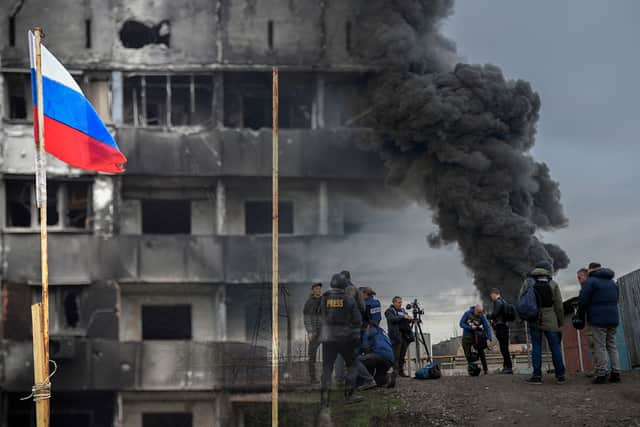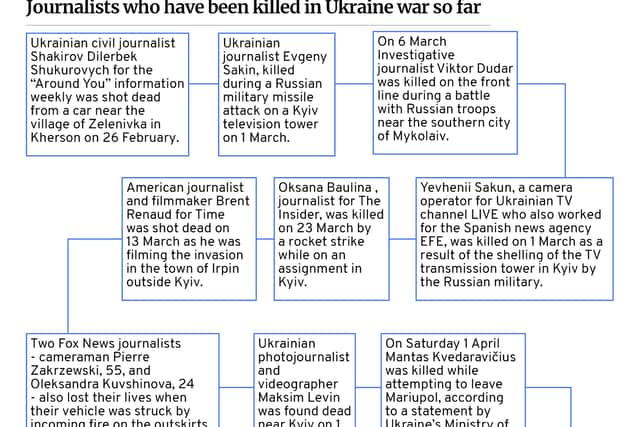Journalists killed in Ukraine: how many have died reporting on Russia war and military conflicts since 2000
and live on Freeview channel 276
Since Russia invaded Ukraine, it is understood that 13 journalists have sadly lost their lives reporting on the conflict.
Ukrainians Roman Nezhyborets and Zoreslav Zamoysky are the latest reporters to have been found killed on Wednesday (13 April) after Russian troops withdrew from Bucha and Yahidne.
Advertisement
Hide AdAdvertisement
Hide AdJournalists reporting in military zones throughout history have put themselves on the line and in great danger to share with the world the true realities of war.
Since 2000, 15 UK-based journalists have been killed when reporting on conflict in war-torn areas.
NationalWorld remembers those brave and remarkable journalists who have tragically lost their lives in the recent Russia-Ukraine conflict and those who also put their lives on the line reporting on other dangerous military conflicts.


How many journalists have been killed in Ukraine?
It is believed that 13 journalists have so far been killed in the Russia-Ukraine war.
Advertisement
Hide AdAdvertisement
Hide AdThe Press Emblem campaign reported that Ukrainian civil journalist Shakirov Dilerbek Shukurovych for the "Around You" information weekly was shot dead from a car near the village of Zelenivka in Kherson on 26 February.
Ukrainian journalist Evgeny Sakin was killed during a Russian military missile attack on a Kyiv television tower on 1 March.
In early March, investigative journalist Viktor Dudar was killed on the front line during a battle with Russian troops near the southern city of Mykolaiv.
Mr Dudar was the second Ukrainian journalist to die since the war started on 24 February.


Advertisement
Hide AdAdvertisement
Hide AdYevhenii Sakun, a camera operator for Ukrainian TV channel LIVE who also worked for the Spanish news agency EFE, was killed on 1 March as a result of the shelling of the TV transmission tower in Kyiv by the Russian military.
Oksana Baulina, journalist for The Insider, was killed on 23 March by a rocket strike while on an assignment in Kyiv.
American journalist and filmmaker Brent Renaud for Time was shot dead on 13 March as he was filming the invasion in the town of Irpin outside Kyiv.
Two Fox News journalists - cameraman Pierre Zakrzewski, 55, and Oleksandra Kuvshinova, 24 - also lost their lives when their vehicle was struck by incoming fire on the outskirts of Kyiv. Both died on 14 March.
Advertisement
Hide AdAdvertisement
Hide AdUkrainian photojournalist and videographer Maksim Levin was found dead near Kyiv on 1 April.
Ukrainian journalists’ union member Yevhen Bal, 78, died on 2 April.
On Saturday 1 April Mantas Kvedaravičius was killed while attempting to leave Mariupol, according to a statement by Ukraine’s Ministry of Defense.
Ukrainian journalists Roman Nezhyborets and Zoreslav Zamoysky were recently found dead on 13 April after Russian troops withdrew from Bucha and Yahidne.
How many UK-based journalists have been killed in war zones since 2000?
Advertisement
Hide AdAdvertisement
Hide AdSince 2000, 15 UK journalists (including US-born Marie Colvin) have been killed when reporting on conflict in war-torn areas.
Three were killed covering the wave of uprisings and violence which erupted across the Middle East from early 2011.


Martin O’Hagan
The 51-year-old died in Lurgan, Co Armagh in Northern Ireland on 28 September 2001.
O’Hagan was an investigative journalist who worked for the Dublin and Belfast-based Sunday World.
Advertisement
Hide AdAdvertisement
Hide AdHe was shot while walking home from his local pub after refusing to bow to pressure to stop publishing stories about the activities of Loyalist gangsters.
The Loyalist Volunteer Force claimed responsibility for his murder but nobody has been prosecuted.
Roddy Scott
The 31-year-old died in the Galashki Region, Ingushetia, Russia on 26 September 2002.
Scott was a freelance cameraman working for Frontline television news agency.
Advertisement
Hide AdAdvertisement
Hide AdHe was killed in the Russian republic of Ingushetia during a clash between Russian forces and the Chechen group with which he was travelling.
Terry Lloyd
The 50-year-old died in Al-Zubayr, Iraq on 22 March 2003.
Lloyd was a correspondent for ITV News and had been working as an independent reporter.
He was caught in crossfire between Iraqi and US troops. An inquest recorded the verdict of “unlawful killing by US forces”.
James Miller
The 35-year-old died in Rafah, Gaza Strip, Israel on 2 May 2003.
Advertisement
Hide AdAdvertisement
Hide AdMiller was a freelance cameraman who was filming a documentary for HBO on the Israel-Palestine conflict.
He was killed by Israeli troops who continued to fire after the reporter he was with shouted “we are British journalists”.
An inquest concluded he had been murdered, but no Israeli soldiers were prosecuted.
Richard Wild
The 24-year-old died in Baghdad, Iraq on 5 July 2003.
Wild was an inexperienced freelance journalist who had travelled to Iraq to cover his first war.
Advertisement
Hide AdAdvertisement
Hide AdHe was shot dead whilst hailing a cab outside Baghdad Museum.
The gunman was never found and it is believed that Wild had not been carrying a camera or anything to identify him as a journalist.
Simon Cumbers
The 36-year-old died in Riyadh, Saudi Arabia on 6 June 2004.
Cumbers was a freelance Irish cameraman working for the BBC.
Advertisement
Hide AdAdvertisement
Hide AdHe was shot dead in the Saudi capital Riyadh by suspected al-Qaeda sympathisers.
Kate Peyton
The 39-year-old died in Mogadishu, Somalia on 9 February 2005.
Peyton had just arrived in Somalia to film a series of reports on the war-torn country.
She was shot outside a hotel having been targeted by what is now believed to have been gunmen with links to al-Qaeda.
Paul Douglas and James Brolan
Both journalists died in Baghdad, Iraq on 29 May 2006.
Douglas was 48-years-old and Brolan was 42.
Advertisement
Hide AdAdvertisement
Hide AdDouglas, a cameraman, and his soundman Brolan, were working for CBS when they were killed by a car bomb, which exploded whilst they were on patrol with American and Iraqi soldiers.
Martin Adler
The 47-year-old died in Mogadishu, Somalia on 23 June 2006.
Anglo-Swedish journalist Adler was a former contributor to Channel 4 News and was freelancing in Somalia for several Swedish newspapers.
He was shot by an unidentified gunman while filming a demonstration in the capital, Mogadishu.
Rupert Hamer
The 39-year-old died in the north-west of Nawa, Helmand Province, Afghanistan on 9 January 2010.
Hamer was a defence correspondent for the Sunday Mirror.
Advertisement
Hide AdAdvertisement
Hide AdHe was killed by a roadside bomb which struck a patrol vehicle, also killing a US marine and an Afghan soldier.
Tim Hetherington
The 40-year-old died in Misurata, Libya on 21 April 2011.
Hetherington was an acclaimed international photographer who was killed by a mortar blast while covering fighting between local militia and forces loyal to Colonel Gaddafi.
US photographer Chris Hondros, 41, died in the same incident.
Marie Colvin
Colvin was killed in Homs, Syria on 22 February 2012.
The Sunday Times foreign correspondent was killed alongside French photographer Remi Ochlik as they reported on the plight of civilians in the besieged Syrian city of Homs.
Advertisement
Hide AdAdvertisement
Hide AdThey were killed when the building they were in was shelled by Syrian government troops.
Mick Deane
Deane was killed in Cairo, Egypt on 14 August 2013.
The Sky News cameraman was shot and killed covering attacks by heavily armed government forces on largely unarmed protest camps in Cairo.
Lyra McKee
Lyra Mckee died in Derry, Northern Ireland on 18 April 2019.
She was a freelance journalist and was shot while reporting on rioting in Derry.
McKee had tweeted from the scene and spoken to journalist colleagues just minutes before she was killed.
The New IRA has since admitted to being behind the killing.
Comment Guidelines
National World encourages reader discussion on our stories. User feedback, insights and back-and-forth exchanges add a rich layer of context to reporting. Please review our Community Guidelines before commenting.
